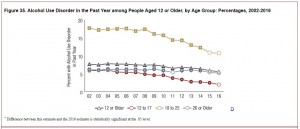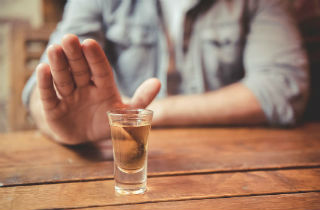ARTICLE OVERVIEW: This article provides you with the key steps you need to take in order to quit drinking for good. Read more for motivation, clarity, and insight into drinking problems here.
ESTIMATED READING TIME: 10 minutes.
TABLE OF CONTENTS
- Are Drinking Problems Common?
- Definitions
- Risks
- Signs
- What Do the Experts Say?
- Medications
- Stopping for Good
- Your Questions
Are Drinking Problems Common?
Yes.
In fact, alcoholism is still America’s number one addiction problem. The 2016 National Survey on Drug Use and Health reported that An estimated 15.1 million people aged 12 or older had an alcohol use disorder that past year. That’s more than 5% of the nation’s population.

As the graph shows above, teenagers and adolescents still remain some of the country’s highest drinkers. Some psychologist say that the reason for the rapid growth of alcohol addiction among the younger population is because alcohol is a forbidden substance under the age of 18 and teenagers are intrigued by forbidden things. It is in the nature of adolescents to challenge the rules.
In addition to this, alcohol is by far the most widely used psychoactive drug in the United States because it is highly available. People have access to alcohol almost everywhere. Plus, we drink it to socialize, celebrate, and relax.
Definitions
Drinking problems come as a result of long term alcohol abuse which evolves as dependence and eventually leads you to addiction. But what does it mean to have a drinking problem? The NIAAA website, Rethinking Drinking defines alcohol limits differently be gender.
FOR MEN, A drinking problem = More than 4 drinks on any day or 14 per week.
FOR WOMEN, A drinking problem = More than 3 drinks on any day or 7 per week.
According to the National Institute on Alcohol Abuse and Alcoholism … excessive alcohol use, including underage drinking and binge drinking (drinking 5 or more drinks on a single occasion for men or 4 or more drinks on an occasion for women), can increase a person’s risk of developing serious health problems.
Risks
Plus, problem drinking causes serious health problems which include:
- Brain damage
- Fetal damage in pregnant women
- Heart disease
- Hypertension
- Liver damage
According to records from the Centers for Disease Control and Prevention (CDC), alcohol use causes 88,000 deaths a year! As alcohol use and abuse increases rapidly every year, studies are showing that addiction can affect the lives of anyone, despite age, gender, religion and race.
Signs
An Alcohol Use Disorder (a.k.a. alcoholism, a drinking problem, alcohol addiction) is a serious and progressive condition. But, the good news is that it is treatable! Since alcoholism is a disorder like other substance abuse disorders, it shares the same characteristics. Signs and symptoms of alcohol abuse can include :
- Acting secretly, lying, and hiding.
- Changes in physical appearance such as lack of personal hygiene.
- Continued drinking despite negative consequences.
- Experiencing alcohol withdrawal symptoms whenever you try to stop.
- Loss of control over drinking.
- Low performance at work.
- Neglecting important activities such as spending time with family and friends, pursuing hobbies or other interests because of alcohol.
- Relationship issues with family, friends and loved ones because of rapid changes in behavior.
What Do The Experts Say?
Addiction Blog Contributor, Dr. Harold C. Urschel, says:
“We treat alcohol addiction as a medical condition-specifically, as a chronic brain disease-beginning with a complete medical and psychological assessment…It’s important to understand that alcohol addiction causes the brain to form deep physical and emotional connections between the substance and the user’s sense of pleasure. These connections make it extremely difficult for those addicted to alcohol to resist the urge to drink, meaning the brain will need at least one year to “reset” itself.”
To learn more on handling alcohol addiction you might want to check out some of the following books:
- Sober for Good, by Anne Fletcher
- Raising Healthy Children in an Alcohol Home, By Barbara L. Wood, Ph.D.
- Believable Hope: Beat Any Addiction, by Michael Cartwright
Medications
The Substance Abuse and Mental Health Services Administration has published a guide to the use of medications in treating alcohol addiction, meant as a medical doctor’s guide. We’ll highlight some of the main points here. But, you can check it out for yourself or download the free pocketguide here. The following medications can be prescribed for people experiencing Alcohol Use Disorder:
1. Disulfiram: This medicine is used as a deterrent to drinking. When taken in combination with alcohol, this medicine causes a significant physical reaction, involving nausea/vomiting, flushing, and heart palpitations. Given sufficient amounts of alcohol in the patient’s system, more severe reactions may occur.
2. Naltrexone (oral and extended release injectable formulations) : This medicine addresses cravings for alcohol. It works by blocking opiate receptors that are involved in the rewarding effects of drinking. Doses are administered every 4 weeks, allowing for medical adherence, plus a more consistent and predictable blood level of the drug.
3. Acamprosate (delayed-release tablets) : This medication is prescribed during withdrawal to address long-term symptoms associated with protracted abstinence. It is thought to work by counteracting the imbalance between the glutamatergic and GABAergic systems associated with chronic alcohol exposure and alcohol withdrawal.
Stopping for Good
So, how you can do it?
How can you finally put an end to your problem drinking? Here are our simple ideas…that we hope will help you.
TIP #1: Seek a diagnosis.
If you have developed an addiction to alcohol, it’s probably best to ask for professional help, due to the seriousness of this matter. In fact, alcoholism is a complex disorder which requires medical care and management. The high rate of relapse among those who tried to manage this problem by themselves confirms the need for support. Plus, many cases of alcohol withdrawal can provoke strong, life-threatening situations.
ALWAYS SEEK MEDICAL SUPPORT WHEN YOU WANT TO STOP DRINKING, ESPECIALLY IF YOU’VE DEVELOPED PHYSICAL DEPENDENCE TO ALCOHOL.
Addiction recovery is a long-term process, requiring devotion and strong will. Look for the right treatment program for you. Or, consult with your family doctor, a psychologist, a licensed clinical social work, or a psychiatrist for help. Alternately, you can use SAMHSA’s treatment locator when searching for a treatment center and explore all your options carefully. Or, give us a phone call on the hotline number listed above.
TIP #2: Become honest in what you say and do.
Addiction is often characterized through lies, but recovery requires honesty! Start with being honest and true to yourself… and then to all those around you. This begins with a drinking assessment such as the AUDIT or Alcohol Screening.org or check out this NPR report on drinking assessments.
Support groups such as AA meetings, SMART Recovery, S.O.S. Recovery, or community support groups can help you open up and share your burdens and experiences with alcohol. People find it easier to relate to others who had same and/or similar addiction experiences.
TIP #3: Make permanent changes in your life.
Treating an addiction does not mean just quitting drinking, but creating a new life that includes healthy habits. Alcohol abuse is only the result of a deeper dissatisfaction from your life. So, in order to quit drinking for good…you need to identify patterns, where they come from, and how you can do things differently. This is what they teach you in rehab. Private counseling or outpatient programs can help, too.
In order to replace drinking with something positive, you need to find other alternative activities to transform any destructive energy you might feel in the future. For example, it has been repeatedly, scientifically proven that exercise is very beneficial for people who are frequently exposed to stress. Find an activities which make you happy and fulfilled. Do not let drinking alcohol to continue being your escape plan!
Another important part of your recovery journey should be changing the way you respond to stressors. Working on your thought and emotional processes can help you regain self-control. Techniques such as mindfulness and meditation can be extremely beneficial part of your alcohol recovery.
TIP # 4: Stick to your treatment plan.
Just as there is no a shortcut to happiness, there is no a shortcut to recovery. If you’ve followed the following tips above, and seek medical help…you should be give an individual treatment plan. This treatment plan is developed to best suit your needs and recovery won’t just happen if you don’t obey the rules of your treatment plan.
As they say: “It does not work if you do not work it!” So make sure to give your 100% attention during treatment! In the end, you are going through recovery for your own wellbeing and health, so that should be a reason enough for you to feel motivated.
Your Questions
Still have questions about getting rid of the booze?
Please leave your questions or comments for us in the section at the end. We love to hear from our readers. And we’ll do our best to respond to you personally and promptly.
Need help immediately?
Give us a call. We’d love to hear from you.









Related Posts